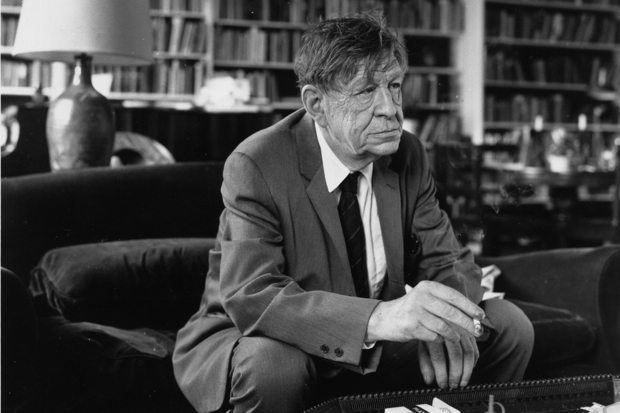‘Goodbye to the Mezzogiorno’ was the first Auden poem that Alexander McCall Smith read in his youth. He discovered it in an anthology, and it puzzled him because he had not then visited Italy. A little later, Smith found Auden’s elegy to Sigmund Freud, and was enthralled by its promise that psychoanalysis frees people ‘to approach the future as a friend/ without a wardrobe of excuses, without/ a set mask of rectitude or an/ embarrassing over-familiar gesture.’ When Smith began his careful, systematic reading of Auden while living under civil war conditions in Belfast, he found the hostility, menace and anxiety of Auden’s pre-1939 poems attuned to his environment.
The poet’s hold on Smith’s imagination and intellect has not slackened. There is no other writer whose work he carries in his suitcase when travelling, ‘as a priest may carry his missal’; no other writer who poses questions and offers answers that still seem so urgent to Smith. His fictional detective Isabel Dalhousie quotes Auden, and the poet’s literary executor and finest exponent, Edward Mendelson, appears in a Dalhousie novel. Little surprise, then, that McCall Smith has written a kindly, avuncular, contemplative opusculum sharing his enthusiasm with the uninitiated.
He sketches Auden’s life and character, and discusses the poems that resonate for him. ‘A Summer Night’ (1933) expresses Auden’s vision of agape, and urges readers to love and value other people for their humanity, without self-interest or conditions. Although Smith seems not to have any religious faith, the Christian injunction to love one’s neighbour — as reiteratively expressed by Auden — seems momentous to him. He thus gives prominence to some lines of Auden: ‘O every day in sleep and labour/ Our life and death are with our neighbour/ And love illuminates again/ The City and the lion’s den.’
Smith allows himself some delightful digressions. One describes a set of French psychoanalysts who collaborated with the Nazi occupiers, went into exile in Morocco with their most therapeutically-dependent patients, and maintained a quasi-religious community so insular that the patients are buried next to their analysts. Another aside recalls Smith’s visit to the Freudian quarter of Buenos Aires, with its Café Sigi, where the habitués don’t squabble about politics or soccer but compare their neuroses, projections and transferences.
Auden reverted to Christianity in the 1940s after recognising that liberal humanism and scientific enlightenment had been powerless to stop the evils of totalitarian violence. Thereafter, his output was celebratory, commemorating domesticity and everyday pleasures, valuing community feeling and local habitats, written with clemency. His later poems are full of thanksgiving, and the last lines he wrote take the form of prayer.
Smith regrets the consumerism which provides the infantilised values of post-Christian western societies. Following Auden, he finds little that is uglier or sadder than a failed materialist mired in discontent and debt. He sees witless, undiscriminating, self-absorbed, rootless consumers for whom life is boredom punctuated by shopping sprees and overeating, ‘overshadowed by things made or done for them a long way from where they are’. Gratitude is a dwindling commodity. Consumerist culture provides all the mechanisms of complaint for bad service or broken parts, but discourages satisfaction.
My one divergence from this earnest, unpretentious, endearing rumination is Smith’s suggestion that ‘Auden would find evil in our own 21st-century world’ in fanatical jihadists, drug-trafficking cartels, and internet child pornographers. Auden’s contempt in 2013, as it was in 1933, would be for resurgent European nationalism, brutish philistinism, the corrupt rhetoric and bullying slogans of opinion-makers and the mad idolatry of money.






Comments